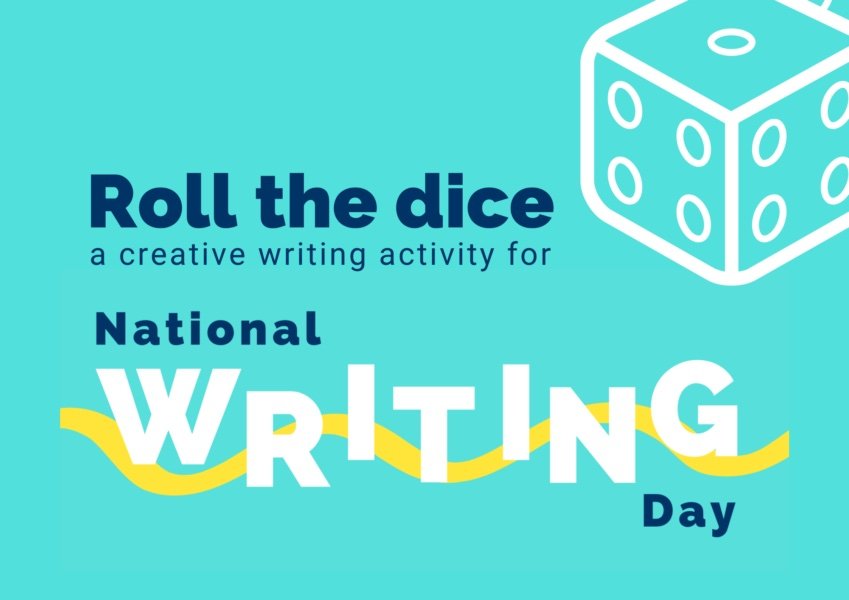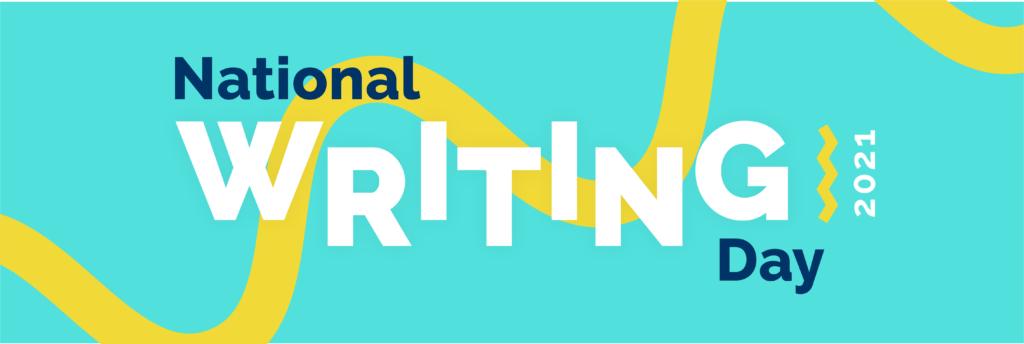National Writing Day 2023 takes place on Wednesday 21st June, with a theme of ‘Roll the dice.’ Videos and suggested ideas/activities for the day can be found here on the First Story website* (and by clicking on the image above). NWP are teaming up with First Story to share these ideas with teachers, children/students and other writers as well as with NWP and WT (Writing Teachers) groups all over the UK. Thanks to Bethan Goddard at First Story for letting us in on the festivities.
On speaking to teachers - notably a few ‘Writing Teachers’ - ahead of the event, some also suggested using story dice** instead of the official activities, or simply just writing prompts or ideas numbered from 1-6 on the classroom board and using a normal die for children, students and adults to generate their own stories, poems, non-fiction, etc. At NWP we firmly believe that many things can get spark our imaginations and get us all to write. You may wish to watch the videos and follow the suggested prompts closely, or you may wish to use the ‘Roll the dice’ theme to come up with your own activities… or, you could go totally off-plan and come up with something completely different! Either way, we always look forward to seeing just what schools, colleges, writing groups and other groups get up to. Feel free to share with us either by emailing us directly or by sharing with us on social media. Don’t forget to tag First Story using the hashtag @writeday. Our contact info can be found here, at the bottom of every page and from the ‘about’ tab on our main menu.
Watch this space and our social media channels for updates throughout this week and whenever writing, photos and the like are sent our way. Scroll down the page to see prompts and some writing from previous National Writing Days. Happy writing - and rolling!
*External website opens in new tab/window. NWP are not responsible for the content of external websites.
**Story dice can be found on websites such as Amazon, in good bookshops, some supermarkets, and in many schools across the country. Alternatively, why not have a go at making your own, from a net of thin card?
Ten Minutes
Thursday June 23rd 2022 is National Writing Day, a day that offers a wealth of prompts and reminders for writing; a day when we can celebrate the pleasures of writing together and alone. It is a day now so well established that we know we can ‘keep writing’; that, whilst it is a wonderful opportunity to celebrate with others, it is also confirmation that a daily practice of writing is good for us in the best of possible ways.
Ten minutes a day and no pressure to produce anything worthwhile. Donald Graves found that if he just sat down with the idea of writing ‘ten minutes of junk’, that soon moved into something that was fun and often became more than that. So we can sit and write for ten minutes, and as we write we begin to see something interesting there. Then we might, as Graves suggests ‘fool around with the junk’ but we might also get involved, find that we are discovering something interesting or a memory or an intriguing pathway.
The other thing that happens – and many teacher writers I know have confirmed this – is that we begin to notice things that we would like to write about. It may be the puzzling habits of primroses. (Last year none appeared in my garden and a neighbour gave me a small clump from hers. This year, the primroses she gave me have not put in an appearance, but the rest of the garden is brim-full with them). It may be something that a child said or that you noticed on your journey home from work. You find your subjects and they find you.
If you are searching for inspiration to get started, try one of these ideas.
Another way of thinking about this is to use the ten minutes to capture a moment from your classroom. The more we notice and allow ourselves a moment to think about what we have noticed, the better we become at getting to the nub of our teaching. Writing and noticing becomes part of our writing/teaching/reading practice. It makes a difference to us. It makes a difference to how those we teach experience us and, as a result, how they experience writing for themselves.
Good wishes for National Writing Day. Make it the day when you pick up your daily writing practice; make it an excuse to grab a coffee with friends, to sit together, maybe in the sunshine, to write for a little while. Make it a day when your classroom becomes a sacred space, brimming with the quietness of many pens on paper, bursting upwards with showers of words, aglow with the lives of those who write them.
The theme of 2021’s National Writing Day is ‘Connections’. There are some great ideas over at First Story, but here at NWP we’ve also been thinking about connections and creative ways of bringing this to the classroom. Here are our top five for 2021:
Make people-shaped books or dancing dolls, Gormley style and decorate the figures with words that signal connection. Add speech bubbles that do the same. In a school it could be fun to think of the things that we say to each other that signal connection. ‘Will you be my partner?’ ‘It’s my birthday. I’ve brought in cupcakes.’ ‘Did you watch ….. ?’ Share them with us @NWPUK, or send in photos for the gallery!
The power of ‘and’: Such a useful little word. Young children often begin to write stories punctuated by ‘and’, creating a beautiful daisy chain of action joined on a rope of ‘ands’. They don’t often get the chance to try that out later because the fullstopcapitalletter police are onto them. Making a list of things that go together, joined by ‘and’ is fun, and not to be reserved for the youngest writers only. The sound and rhythms of these pairings are tremendously satisfying and invite themes and jokes, or further rhymes. There are pairings we commonly use: cup and saucer, salt and pepper, biscuits and cheese; the idiomatic: an arm and a leg, down and out, over and out; how about pairings that are unexpected: fish and bicycle? For more on the use of ‘and’ in a workshop, see Jeni’s latest From the Director’s Chair. Again, we’d love you to share @NWPUK.
Connections through maps. Make a ‘collaborative’map in the style of the London Underground map, with large and smaller stations that indicate different kinds of connections made over the last year. emphasizing the idea of journeys through lockdown. Perhaps some larger stations might include ‘Zoom’ or a particular class trip - the points where many in the room have intersected. Different coloured lines might indicate individual connections made - perhaps family connections, friends, school, shopping. Then each writer can make their own journey in writing. We only have to ‘fill the box’, so you could choose one connection, or write a short piece for each relevant station. We have found that the more opportunities we have had to talk and write about the experiences of the last year, the better we have been able to make sense of them. Small post-its could then be attached to your lockdown tube map. You can read more about how this idea might work in practice in From the Director’s Chair.
Lockdown ‘connections’ map for writing
4. More connections writing could come from writing a praise song. Liz Venn’s ‘Song for The Women I’ve Worked With’ is a great example. Here is the first verse:
This is a song for the women I’ve worked with,
for the plasters I’ve borrowed, the aspirin,
for the Friday prosecco, the trainers they wear
to commute and the heels they work in.
And here is the last verse which sends up a prayer for the usually unsung people who help us through our days:
May every Friday be Cake Friday.
May grey never touch them.
May their passwords be strong.
Students might write about their parents or teachers, or the school caretakers with mop, bucket and sawdust, the secretaries and bursars, their friends or neighbours or fellow football players. Read more here.
You can find Liz Venn’s poems in Cast: the Poetry Business book of new contemporary poets. Her website is https://lizvenn.wordpress.com/poetry-prompts-blog/.
5. Write about hair as a distinguishing feature which both connects and divides. All of us have stories about hair, and they are often closely tied up with identity, culture and connections of all kinds. Adapted from an original idea by Kate Clanchy, and used for 2020’s Poetry Day using Rachel Long’s poem ‘The Omen’ Further inspiration can be found from Neil Gaiman’s picture book Crazy Hair and and Hannah Lee’s picture book My Hair for younger children. You can read more about how we have used this prompt here.
National Writing Day 2020 #247
The theme of this year’s National Writing Day is “One day”. Of course, the thing about this day is just to get us all writing -and enjoying it. Write alone, write with others in your household, write with others on Zoom.
You can choose to follow the theme or you can choose other ideas. There are plenty of links on the First Story website. First Story, have set a #247 challenge. Everyone is asked to write a story of 24 words in 7 minutes. Not so easy , I assure you. There are videos on the First Story website of authors giving handy tips. Frank Cottrell Boyce gives the best advice which is to think about the ‘one day’ as the moment when something begins to happen.
You don’t have to keep the words ‘one day’ in the story. You may be glad to get rid of them. Twenty four is not very many words. If you are not be able to think of 24, you could be glad to include ‘one day’! Building on both ‘one day’ and #247, we have some ideas below for you, too.
National Writing Day 2020 NWP
Here are some prompts in the style of Natalie Goldberg that are great for quick freewriting. They often lead to interesting places so they may be all you need for a good writing session. Write on each of the following for three, ten, or even twenty minutes.Or choose one that takes you further, deeper, longer.
Give the detail. You might even begin, ‘One day ….’
A memory of swimming
A time when you have been alone
A memory of drinking from a bottle
A time when you went shopping
A wall you once encountered
A memory of sound, or taste, or touch.
National Writing Day 2020
Try writing a 24 word story that is memoir. Something you did one day. There will be many stories to tell: One day I …….. Where were you? On a holiday, maybe, somewhere very ordinary, or very unusual. What was your mood, what were you feeling, what were your thoughts? It could be a poem.
One day
we climbed a mountain.
The mist came down.
We took the wrong path
down the other side.
Wrong valley.
Mick rescued us.
Or get rid of ‘one day’:
Joseph and I cooked
the pan was hot
we poured in brandy
lit match, blue flames
stood back Jo’s hair
was on fire
blazing
Each one of those 24 words has to work flat out. You might not want to limit yourself to 24 words. You might just want to capture the story, one day…





